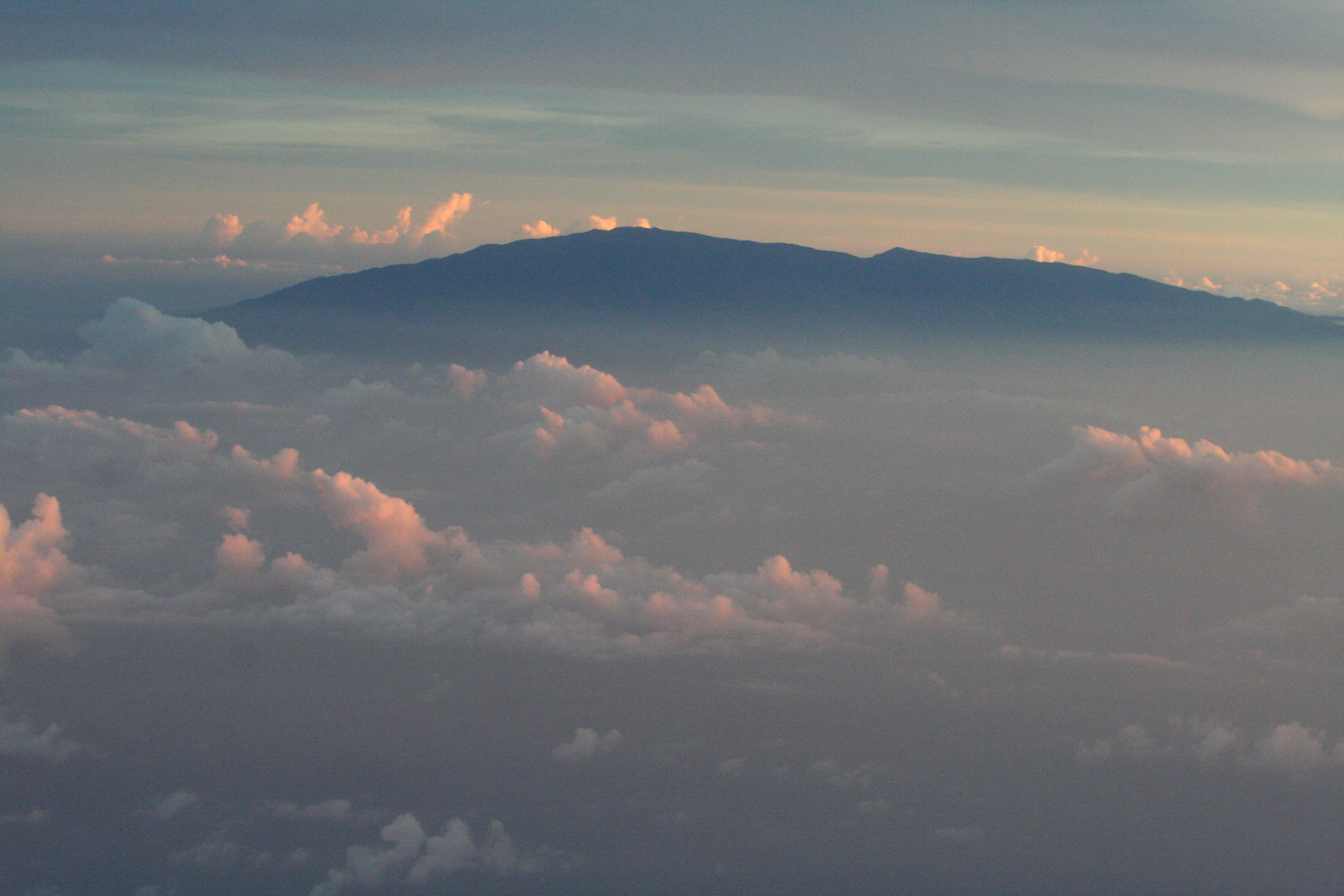Maui Conference Uses Traditional Knowledge in Response to Climate Change

Haleakalā on the Island of Maui, Hawai‘i, rises above the clouds. Photo credit: Kalei Nu‘uhiwa
A Maui conference is planned to examine the role of traditional knowledge in responding to climate change.
For millennia, Native Hawaiians and other Pacific Peoples have relied on lunar calendars to measure the cycles of the natural world and guide cultural, community, and resource management. Conference organizers say turning to contemporary science and policymakers for solutions isn’t the only option.
‘Aimalama: A Mauliauhonua Experience will take place August 9–11, 2018, at the University of Hawai‘i Maui College campus in Kahului.
The three-day conference will guide attendees on how to create their own kaulana mahina (Hawaiian lunar calendar) specific to their local environments, strengthen their kilo (observation) skills, and leverage best practices for recording site-specific natural events.
‘Aimalama is open to the public and includes keynote addresses, hands-on breakout sessions, and a selection of huaka‘i (guided day trips) to organizations and community programs on Maui that incorporate lunar calendar knowledge and traditional observation practices in their endeavors.
Registration opens online at aimalama18.eventbrite.com on Monday, April 16 at 9 a.m. A limited number of early-bird registrations will be available for $350 per person, with the rate increasing to $450 once the early-bird registrations sell out. Moloka‘i and Lāna‘i residents unable to travel to Maui may register to participate in select sessions via distance-learning facilities at UHMC’s Moloka‘i and Lāna‘i Education Centers.
“We aim to make impact on a community level by encouraging people not just to rely on contemporary science and technology to measure what’s happening around us. We want to empower them to ‘be the app,’” said Kalei Nu‘uhiwa, a Hawaiian lunar practitioner and one of ‘Aimalama’s founders. “We are excited to build on the successes of our past conference and community-based workshops to help island residents and leaders craft solutions to help us all thrive and survive the changing climate.”
Mauliauhonua: nvs. Descendant of old chiefs of a land; established, ancient, as a family. Ua kū kēia welo ā mauliauhonua, this family is old and well established. (Ka puke wehewehe a Pukui/Elbert)
The term “mauliauhonua” is a reference made to a family or community that have resided in a particular location for multiple generations. Mauliauhonua have personal collective experiences from their surroundings that have informed their methods of survival. Mauliauhonua communities have learned about the winds, rains, characteristics, seasons, flora and fauna resource behaviors, and social and political changes to a point where they have been able to adapt and survive efficiently in their own environments.
Collectively, they have become their own specialized experts of their own geographical locations. ‘Aimalama’s goal is to provide tools on how to become mauliauhonua for families and communities in order to successfully and collectively adapt and survive the changing climate.
Keynote Speakers: “What kind of ancestors do we want to be?”
Keynote speakers include Hi‘ilei Kawelo, founder and executive director of Paepae o He‘eia fishpond, Dr. Rosie Alegado, assistant researcher in the Department of Oceanography at the University of Hawai‘i at Mānoa, and Hōkūlani Holt-Padilla, director of the Ka Hikina O Ka Lā student scholarship program at UHMC and Kumu Hula (hula teacher) and founder of hālau hula Pā‘ū O Hi‘iaka. Kawelo and Alegado will discuss their 12-year study at the fishpond, discoveries made regarding El Niño & La Niña, and how integrating ʻAimalama methodologies informed their research. Holt-Padilla’s address will encourage participants to ponder the question, “What kind of ancestors do we want to be?”
Many Pacific societies are currently reviving and reconnecting with their ancestral lunar calendar to restore wisdom of agricultural productivity, marine and forest gathering, resource management, health and healing, and daily practices that provide sustenance for the health and well-being of communities. ‘Aimalama seeks to attract leaders and innovators operating at the intersection of ancestral knowledge and technological transformation to identify common ground to respond to community, regional, and global challenges.
‘Aimalama: A Mauliauhonua Experience is sponsored by Kamaʻaha Education Initiative, University of Hawaiʻi Maui College, Hawaiʻinuiākea School of Hawaiian Knowledge at the University of Hawaiʻi at Mānoa, and Mo‘olelo Mahina.
In 2013, the group ‘Aimalama formed as Hawaiian cultural practitioners gathered with the intention of reviving traditional kaulana mahina (Hawaiian lunar calendar) practices as a resource and climate change management tool. The term “ʻAimalama” was chosen to represent the combined practices of the kaulana mahina and kilo (environmental observation) to recognize and adapt to environmental trends. ʻAimalama represents the determination of the partners and communities seeking to find solutions to survive a changing climate with the intent to persevere and thrive.










